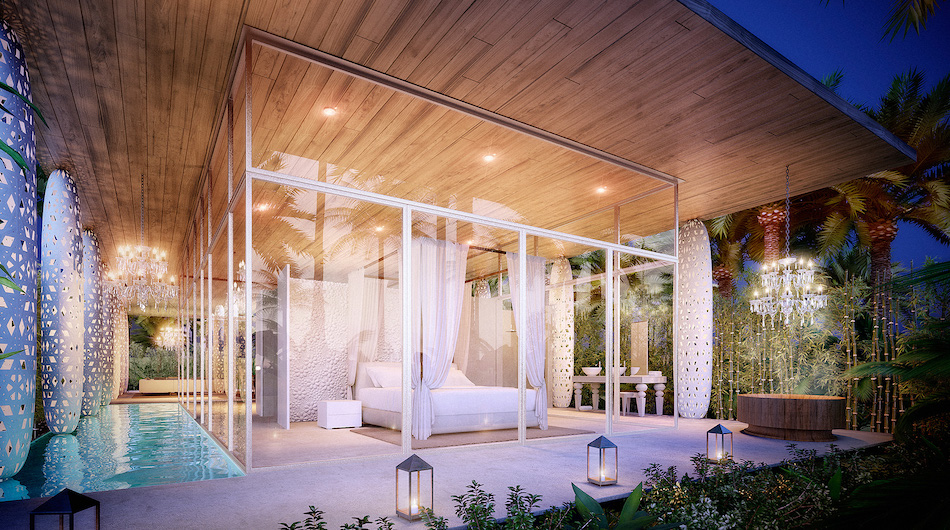
A modular home designed by David Salle. Photo credit: Revolution Precrafted.
Diverting from its overall seed strategy, 500 Startups’ Durians fund for Southeast Asia has made an investment it couldn’t miss out on.
Unlike most of its portfolio startups, Revolution Precrafted wasn’t really raising money, has been profitable from the get-go, and is on track to achieving unicorn status.
What’s more interesting is that it’s not based in markets like Singapore or Indonesia, which have predominantly figured on investors’ radars. It’s born in the Philippines.
Revolution sells prefabricated homes conceived by dozens of world-renowned architects and designers like Zaha Hadid, David Salle, Tom Dixon, Marcel Wanders, and Lenny Kravitz’s Kravitz Design.
It was founded by Robbie Antonio, whose family has been a formidable player in the Philippines’ real estate industry. A voracious art collector, Robbie is the brains behind US$2.1 billion worth of the family business’ branded projects – all collaborations with big names such as Forbes Media, Armani/Casa, Versace Home, Missoni Home, Paris Hilton, Philippe Starck, and the Trump group.
The prefab homes, priced an average of US$120,000, can be ordered through the company’s site and shipped anywhere in the world in 90 days.
“We’re changing the landscape of home building. Now you have the world’s best architects at your fingertips for an affordable price,” Robbie tells Tech in Asia. “We’re applying the home as an art concept as well. They’re collectibles.”
Design democratization
“I’m almost obsessed with design and architecture,” Robbie adds.
Robbie has commissioned his homes and his personal art collection from the world’s top architects and artists. He is among the world’s top 100 art collectors, alongside Franois Pinault, Sheikha Al-Mayassa, Bernard Arnault, Steve Cohen, Leonardo DiCaprio, Miuccia Prada, Paul Allen, Alice Walton, and Wang Jianlin – to name some.
Now he wants to bring his passion to the masses. “I believe in design democratization. It should not just be the upper echelons who should be able to afford great architecture.”

Robbie Antonio. Photo credit: Revolution Precrafted.
Inspired by Airbnb, his company is using technology to disrupt real estate. Unlike traditional players, it’s very low on capital expenditures as it doesn’t own land; it’s not forced to sell in particular sites – it ships homes globally; and it gets its cash flow in three months versus three to four years’ turnover time for brick and mortar firms.
With tech as the “very fiber” of its DNA, it has a network of over 180 fabricators around the world who use advanced modular tech and robotics to create the products. “We know exactly where to go to, who can do this with great quality at very affordable prices,” says Robbie.
To buy a prefab home, a client pays a down payment, and waits for the components to be delivered. That client gets his own contractor to assemble the whole thing or pay a little more for Revolution to help build it.
Revolution takes orders from both property developers who sell to buyers or the buyers themselves. Robbie says they earn a profit margin of 35 percent.
A fast-growing business
Within a month of its 2015 launch, the company had turned profitable, a feat surpassing most startups in the region. To date, it has booked US$110 million in orders for real estate projects.

Another prefab home – this time by Marcel Wanders. Photo credit: Revolution Precrafted.
While it didn’t need outside funding, the company wanted to welcome investors who would be helpful.
The US$15.4 million it raised from 500 Startups’ second Durians fund and some angels was its first round, bringing its valuation to US$256 million.
The contribution from 500 was the only VC money Revolution has taken in so far, says managing partner Khailee Ng. Among 500’s 1,800 portfolio companies, it was one of the highest valued – at the time the VC invested in them, Khailee confirms.
Recognizing Revolution’s potential, he says they fought hard to get into the unusual deal.
“Our seed companies rarely have US$100 million product bookings and enough finances. [Revolution] didn’t need to raise. I had to convince them to take my money for value-add, not cash,” he explains to us.
The ability to ship a designer home anywhere for the same price or even lower is what sets Revolution apart from other prefab companies – which Robbie estimates to be a US$100 billion global industry. It plans to expand to condominiums, hotels, and pop-up retail stores.
“The prefab industry is very fragmented – Americans are catering mostly to Americans, Europeans are doing the same thing with other Europeans, likewise Asians,” says Robbie.
“I wanted to have a cross-border transaction business… that’s what makes it really geared towards being, I believe, the first Philippine unicorn.”
This post 500 Startups just invested in what could be the Philippines’ first unicorn appeared first on Tech in Asia.